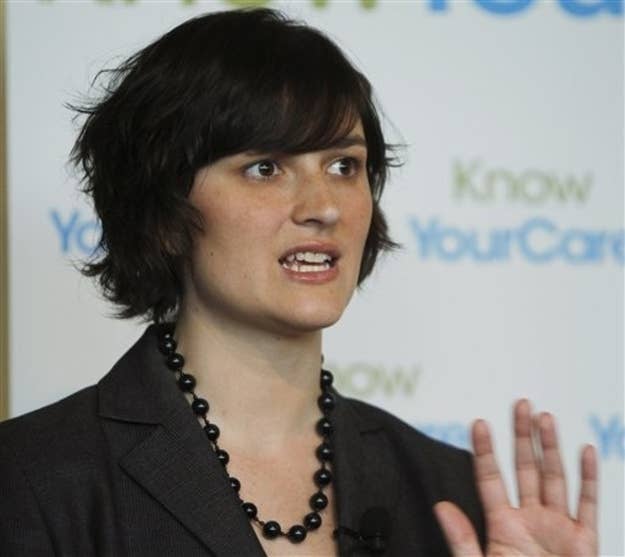One name and one word could be heard coming from nearly every woman’s mouth following a talk in New York Wednesday night. And they were: “Sandra Fluke” and “troublemaker.” Fluke spoke at the 92nd Street Y on a panel about “women in politics” moderated by Chelsea Clinton and sponsored by Glamour magazine. (It had the unnecessary title of “Running in Heels” — but at least defining politicians by their fashion choices in such a way reminded everyone of why the talk itself was necessary!)
After the conversation had dragged on for a while about how stereotypically feminine traits like emotionally understanding other people can greatly help women in politics, Fluke began, “Maybe I’m the troublemaker onstage today” — suggesting she was about to change the course of the discussion with another of her interesting, unexpected points — but, “if we want to get to a female secretary of defense we may need to be careful about talking about how collaborative and emotional and fabulous we are in those ways, because women can also be tough.” It was one of the many statements that are only making her a bigger rockstar than she already is.
Fluke, of course, is an example of tough, having flourished as a women’s rights advocate and all-around smart, impressive person following Rush Limbaugh calling her a “slut” and “prostitute” in response to her testimony before House Democrats to support mandating insurance coverage for contraceptives. She walked on stage to enormous cheers and applause Wednesday night, and was all anyone could talk about when the discussion finished. “She’s not afraid to say what she thinks,” I heard one girl tell a friend. “She was the most interesting speaker,” said another. (The panel also included Nicolle Wallace, Stephanie Schriock, Abby Huntsman Livingston, Christine Quinn, and Amy Holmes.)
She talked about the Limbaugh incident, explaining that she thought carefully about how to address the situation because she didn’t want young women to think that when you enter the public eye and speak for something you believe in, you’re automatically shamed and have to slink away. “I wanted to be an example of someone who did not go away as a result,” she said. “I wanted to talk about how it was an attempt to silence women because I wanted to have young women understand it as that.”
A Georgetown University Law School student, Fluke chimed in on the topic of why women don’t run as much for public office as men. While many of her female classmates are politically engaged, as one might expect fewer talk about running for office, she said. Instead, “they talk about being staffers, being policy people.” She told of an event she helped organize in which speakers came to the campus to talk to women about how they can go about runing for office. Despite the school’s “power-hungry” students, the event turned out to be “lackluster.”
Fluke offered some insight into why that particular event turned out that way. “I was speaking at an event, and I was talking about encouraging women to run for office, and one of the things that I said was some people had been writing to me to encourage me to run,” she said. “I said something very noncommittal like, oh, someday maybe I will. And that was a terrible thing to say apparently.” The remark was “portrayed negatively in a lot of press,” she said.
She shared two moments of noticeable solidarity with Clinton, who introduced her by saying that she, too, had been attacked by Rush Limbaugh, who called her a dog when she was 13 years old and living in the White House. The second came when Clinton interrupted the discussion to joke to Fluke, “Feminism is a bad word — did you know that?”

